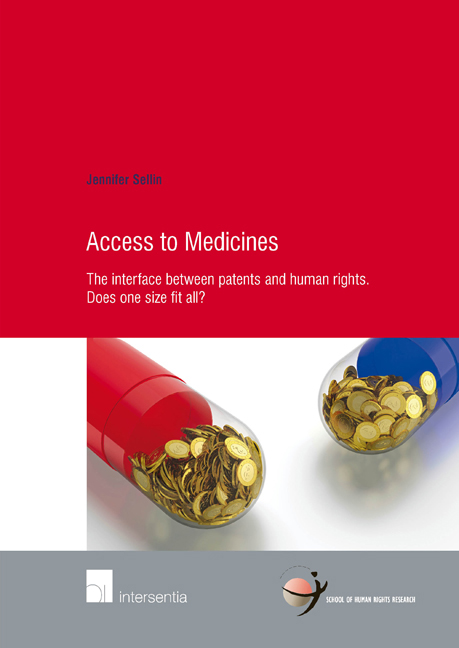Book contents
- Frontmatter
- Dedication
- Acknowledgements
- Contents
- List of Abbreviations
- Part I Method and Problem Statement
- Part II International Framework
- Chapter 3 A Human Right of Access to Medicines?
- Chapter 4 The TRIPS Agreement: Patent Protection for Pharmaceuticals
- Chapter 5 The Interface between Patents and Human Rights in the Context of Access to Medicines
- Part III Country Studies
- Bibliography
- Curriculum Vitae
- Miscellaneous Endmatter
Chapter 5 - The Interface between Patents and Human Rights in the Context of Access to Medicines
from Part II - International Framework
Published online by Cambridge University Press: 22 November 2017
- Frontmatter
- Dedication
- Acknowledgements
- Contents
- List of Abbreviations
- Part I Method and Problem Statement
- Part II International Framework
- Chapter 3 A Human Right of Access to Medicines?
- Chapter 4 The TRIPS Agreement: Patent Protection for Pharmaceuticals
- Chapter 5 The Interface between Patents and Human Rights in the Context of Access to Medicines
- Part III Country Studies
- Bibliography
- Curriculum Vitae
- Miscellaneous Endmatter
Summary
INTRODUCTION
This chapter addresses the interface between international trade law and intellectual property law with international human rights law in the context of patent protection for pharmaceuticals and a right of access to medicines. The issue of access to medicines sits on the cross-point between the three systems and is one illustrative example of how these systems interact. The starting point for this discussion is that international trade law (which includes patents) can have significant benefits for the protection and promotion of human rights. This thesis adopts a legal approach to assess how international patent law and international human rights law interact in order to determine potential conflicts between both systems. It must be recognised however, that the debate takes place against the background of broader social, economic and political discussions.
International trade law and intellectual property law have historically been isolated from international human rights law. Human rights have not been very prominent in the World Trade Organisation. For a long time, international trade law was considered a very technical subject dealing with mainly economic analysis and beyond the scope of general international lawyers. Furthermore, some of the members within the WTO political bodies have shown concern in including human rights within WTO deliberations. In that sense the debate within the WTO on the possible impact of intellectual property rights on access to medicines, which resulted in the 2001 Doha Declaration on TRIPS and Public Health and a proposed amendment to the TRIPS Agreement, is remarkable in that it, although not explicitly, addresses human rights concerns within the WTO framework. See for example the debate preceding the adoption of the Doha Declaration in which a number of WTO members, mainly developing members, refer to the right of access to medicines, the right to health and the right to life as the context for the discussion of TRIPS and public health. Consequently it is only in the last decade and a half that the links between human rights and international trade are being fully recognised.
- Type
- Chapter
- Information
- Access to MedicinesThe Interface between Patents and Human Rights. Does one size fit all?, pp. 225 - 290Publisher: IntersentiaPrint publication year: 2014

